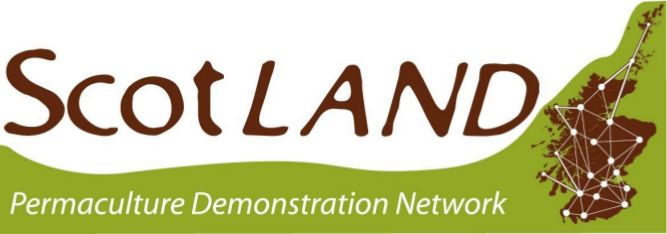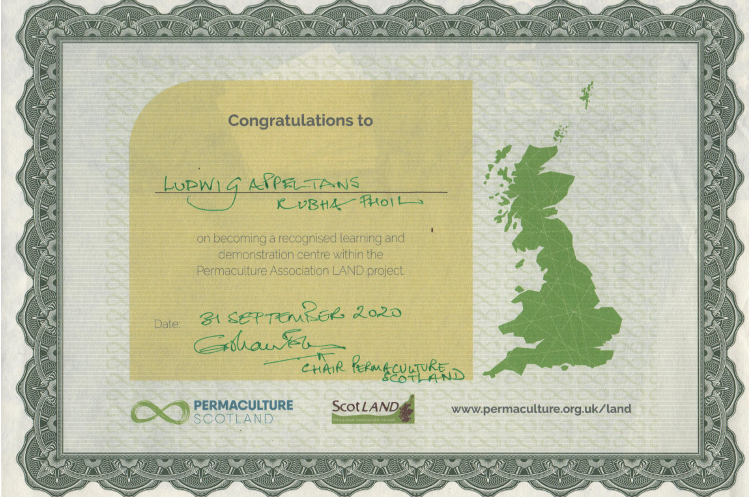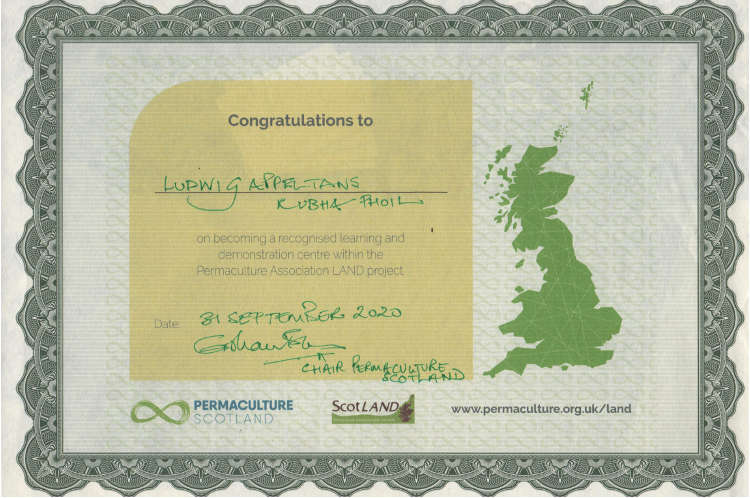Rubha Phoil was recognised as a Permaculture ScotLAND Center:
To be clear we have temporarily withdrawn from this network. The reasons are explained below.
First the words in which we celebrated our earlier achievements:
News from September 2020:

We are proud of this achievement:
Rubha Phoil is recognized as a Permaculture ScotLAND Demonstration Centre.
We are really proud to announce that we are recognised as a Permaculture ScotLAND Demonstration Centre!
This means that the official body, the Permaculture Association of Britain has officially found our rock and us to be an excellent example of permaculture in action. A place where people can come, see and learn real permaculture.
The rock first got given the label “permaculture” in 1992 when the previous owner started her project. In 2013 the first application to be approved as a ScotLAND Centre was deferred. Now after 4 years of hard work by Ludwig and the more than hundred volunteers who supported the project since, we have been successful. Rubha Phoil is officially a ‘Permaculture Project’ worthy of the label ‘Permaculture’.
More details:
On 31 September 2020, the Rubha Phoil Permaculture project, under guidance of Ludwig Appeltans has been officially recognized as a Permaculture ScotLAND demonstration Centre by Graham Bell. This means that we are recognized as an excellent demonstration of permaculture in action. Along with our skill in applying permaculture, we have demonstrated our ability to explain our use of permaculture ethics and principles to visitors and volunteers and offer opportunities for learning.
You can read more about permaculture ScotLAND Centres here.
The previous owner of Rubha Phoil in 2013 had already applied for Rubha Phoil to become a Centre, but was accepted as a ScotLAND Learner Center instead. (A ScotLAND Learner centre is a centre that is learning how to become a demonstration Centre.) It took 7 years of hard work and the help of a lot of people to get there, but we made it! We are now finally really able to say that Rubha Phoil is a Permaculture Project where you can see real permaculture in action!
Why is this important?
Like the label “Organic”, “Permaculture” is a registered trademark. Like organic, permaculture people have to adhere to a set of strict guidelines for their project or land to be allowed to be labelled permaculture. In permaculture we have to have successfully completed a PDC (permaculture design course) and adhere to the 3 permaculture ethics of People Care, Earth Care and Fair Shares before we are allowed to use the word permaculture as a label for our work.
But unlike with Organic, this is not enforced. If you call something organic and it isn’t you can get into legal trouble. With Permaculture, not so much. The ownership of the trademark lies with the founder of Permaculture: Bill Mollison (or more specifically with the people that inherited his estate when Bill became a legend and entered the afterlife.) Bill never seemed in favour of such a regulatory body to take action to enforce the correct use of the word. Which in any case is not really a difficult problem to solve: you create a badge of honour instead. Rather than spending energy on stopping a negative, celebrate and promote a positive instead: ScotLAND CENTRES!
Everyone with a badge of honour called “Permaculture ScotLAND Demonstration CENTRE” has been peer reviewed and has been found worthy 🙂
Thanks Graham and Ed!
Regardless of that discussion, it still leaves us, permaculturists, with the task to explain this message to the world. If you’d ask the average person, the terms permaculture brings up images like: harmony with nature, calm, health and well being, trees, hippie, birdsong, cups of tea, respect, mud, kindness, equality, peace, community, harmony, collaboration, food & nature etc…
Sadly, as the trademark is not enforced, anyone can use the word to try to greenwash their crimes, The label “Permaculture” is also an ideal undergrowth for people to hide and take advantage off. It is too easy to hide land abuse and people abuse practices under a green washed label of permaculture.
What does make it permaculture, is the way the permaculture ethics are adhered too.
These are the three simple key ethical principles. Earth Care, People Care and Fair Share. These ethics are found in many traditional societies which have existed in relative balance with their environment for much longer than more recent civilizations.
Earth Care asks us to preserve the soil, keep the air and water clean, protect and enhance biodiversity, and conserve energy and natural resources.
People Care is about health and well-being, nourishment with good food, lifelong learning, trust, respect and meaningful work, mental and spiritual well-being, a healthy abundance of connections.
Fair Share emphasizes equitable distribution of resources, networking and cooperation, reduction of consumerism, and rethinking notions of growth, progress and development. In the present and in the past. Honouring people that came before us, leaving a nice planet behind for the ones that come after us.
We can call it permaculture if we work towards helping at least one of the ethics and not negatively influence any of the 3. So it is part of the solution towards a permanent culture.
Remember, putting the label “permaculture” on something doesn’t make it permaculture.
Instead, ask yourself these questions:
– Do they look after the Earth?
– Are they kind to People?
– Do they Share the surplus?

Check your sources before you believe labels! In these trumpian times now more than ever. And I hope that you have discovered that maybe you are already doing things that you can call permaculture. Join our Virtual Village if you want to learn more.

About our withdrawal from the ScotLAND Centre network:
In September 2020, we were really proud to have achieved the status of being a recognised ScotLAND Centre. As it gives us some recognition of the quality of work we are doing here.
We have now withdrawn from that NETWORK.
I have learned that the ScotLAND network has received a £5000 grant, which was designed to support stronger, more resilient communities, in the Highlands and Islands. The PAB have used the grant partially, to give away free memberships to the Permaculture Association of Britain and to pay to develop resources that are for the benefit for everyone in Britain and worldwide. Almost all the money goes to the British PAB accounts, and as I understood it at the time of my withdrawal,
NONE stays in the Highlands and Islands.
My request on Jan 19th 2021 to make sure that the money was better spend and more to a benefit for local people in the Highlands and Islands (as is required by the conditions in the grant), has been completely ignored. This has been organised by Andy Goldring, the CEO of the Permaculture Association of Britain (PAB) himself. This grant has been approved by the Grant provider, but in my view upon checking the actual grant application, the application was dishonest. There are some other issues that are in my view completely unethical and completely against Permaculture Ethics and Principles. They all indicate a serious need for the PAB to decolonise.
Here in the Highlands and Islands, we are lucky to have the excellent writer Alistair McIntosh. He wrote a book called Soil and Soul. It documents the horrific history of how the Islands were treated throughout history: as a colony. Much like the rest of the colonies of the ‘Great’ British Empire. Colonised by the elite powers from down south, but also by the elite in lowland Scotland. Such as the violent incursions of 1596, 1599, 1605, 1607 and 1608. Where lowlander Scots from Fife in Lowland Scotland were granted a charter, Royal Permission From James VI to colonise the Isle of Lewis, Rona and Trotternish in Skye with law abiding Protestants.
I hope I don’t need to tell you about the Highland Clearances and the suppression of the local Gaelic Culture? Rubha Phoil is surrounded by cleared villages.
I also hope that I do not need to tell you about the ongoing crisis of gentrification and ongoing challenges for the people in the Highlands and Islands and the challenge of the Gaelic language and culture to survive.
We are following up this discussion and until this is resolved, we don’t feel comfortable being part of a network that we feel is acting unethically. After all integrity and respect and understanding of local history is central to Permaculture.
Hopefully this discussion will lead to a positive change in attitude in the British Permaculture Circles.
To be continued….
